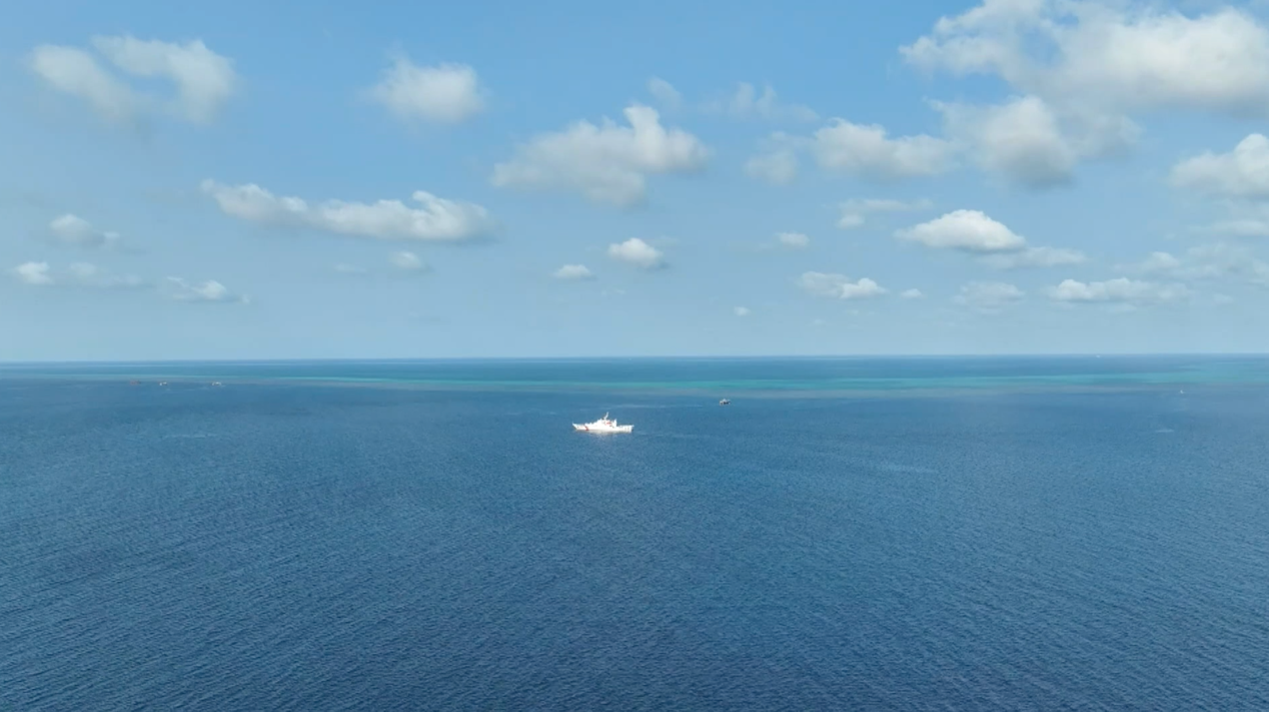Editor's note: CGTN's First Voice provides instant commentary on breaking stories. The column clarifies emerging issues and better defines the news agenda, offering a Chinese perspective on the latest global events.
Philippine President Ferdinand R. Marcos Jr. signed two "laws" in Manila on Friday – the Philippine Maritime Zones Act and the Philippine Archipelagic Sea Lanes Act, declaring "Philippine maritime zones" and designating "sea lanes" in archipelagic waters for foreign vessels and aircraft.
On Friday, Marcos claimed in a keynote speech that the two "laws" were aligned with international law, specifically the UN Conventions on the Law of the Sea, or UNCLOS. But what is the reality?
Under the pretext of "implementing" the UNCLOS, the Philippine government is putting a legal veneer on its illegal claims and actions in the South China Sea. The so-called "laws" are against the provisions of international laws including the UNCLOS and the UN Charter, and against the spirit of the Declaration on the Conduct of Parties in the South China Sea.
By advancing its domestic legislation, Manila is deliberately packaging its territorial claims as maritime jurisdiction claims. This violates the principle in international law that the "land dominates the sea."
The UNCLOS states that territorial sovereignty is the precondition and foundation for the generation of maritime rights and interests. In other words, maritime rights are derived from land sovereignty. The Philippine government, by declaring maritime zones in disputed waters, has violated China's territorial sovereignty and contradicted the UNCLOS itself.
"The Philippine Maritime Zones Act is illegal as it has severely violates the UNCLOS principle of the 'land dominates the sea,'" said Zhang Xuegang, director of the Center for Belt and Road Initiative Studies, China Institutes of Contemporary International Relations.
In addition, the Article 53 of UNCLOS stipulates that "ships of all States enjoy the right of innocent passage through archipelagic waters." "The Archipelagic Sea Lanes Act, by designating 'sea lanes' in archipelagic waters for foreign vessels and aircraft, has violated the Article 53," Hu Xin, assistant research fellow of the National Institute for South China Sea Studies told CGTN.

An aerial photo of China's Huangyan Dao. [Photo/China Coast Guard]
Manila claims that its "rights" to its maritime zones and entitlements are exercised in accordance with the Hague-based arbitral tribunal. True, the Philippines initiated the South China Sea arbitration case in 2013, but the arbitral tribunal violated the basic principle that international judicial and arbitral institutions should follow.
The third-party compulsory arbitral procedure without the consent of the states involved breaches international law and deviates from the original intention of the UNCLOS States Parties in designing the dispute settlement mechanism.
"China neither accepts nor participates in that arbitration, neither accepts nor recognizes the award, and will never accept any claim or action arising from the award," China’s Foreign Ministry has said. In this context, the arbitration – the "basis" of Manila's territorial claims – is illegal, null and void. It is a farce.
Resolving disputes with unilateral "legal" resolutions will only squeeze the political space for Beijing and Manila to jointly control crises and inevitably make the situation in the South China Sea more complex. The Philippine government under Marcos realizes this but is still intensifying provocations against China. The reason is that facing a slew of domestic headaches, Marcos is playing the South China Sea card in an attempt to divert public attention.
It is worth noting that former Philippine president Rodrigo Duterte has registered as a candidate in the 2025 election for mayor of Davao. This, apparently, is not good news for Marcos. To boost his popularity, Marcos is now attempting to shape his image as a "defender" of the country's and people's interests. In this context, provoking China on the South China Sea issue could be effective in rousing domestic populist sentiments and thus gaining popularity.
In addition, since assuming office, Marcos, on several occasions, has conveyed his goodwill to Washington, naively regarding the U.S.-Philippine Mutual Defense Treaty as a shield for his anti-China provocations. Relying on Washington's support, the Marcos administration has become increasingly blatant in fueling tensions in the region.
However, China has a strong will and capability to safeguard its sovereignty, security and development interests in the South China Sea, and the U.S. is unlikely to sacrifice its own interests for the sake of the Philippines. Therefore, Manila's repeated provocations will only result in a multi-loss scenario. To address the South China Sea dispute, the only solution is to return to the right track – settling differences properly through negotiation and consultation.

 中文
中文



